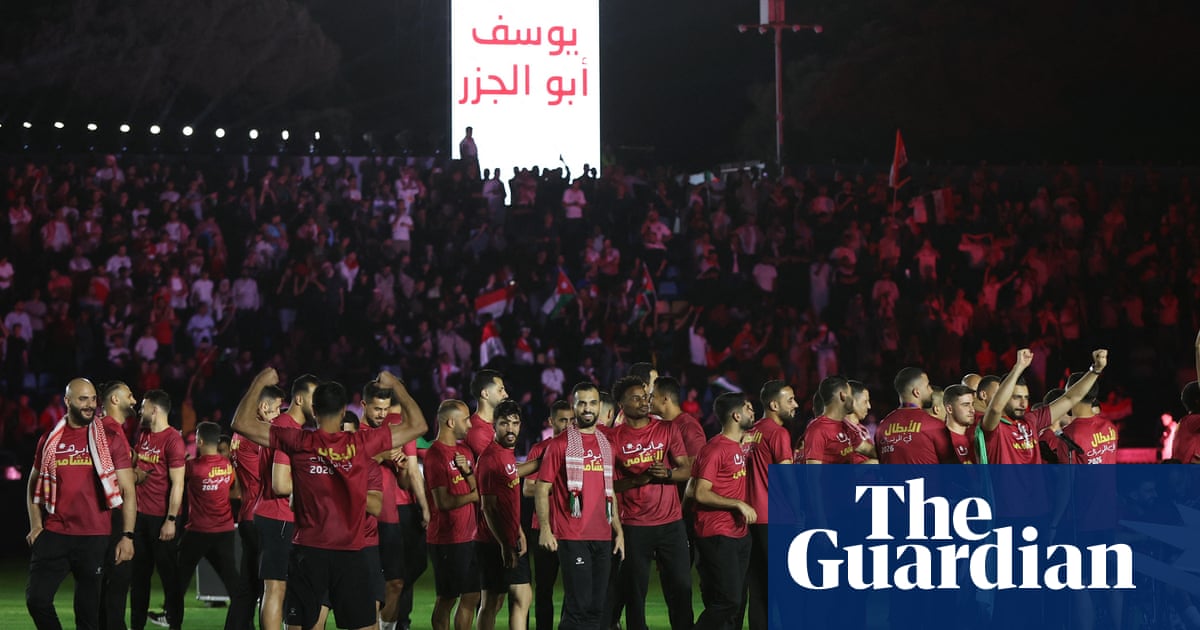WouldHarry Redknapphave taken Jordan to the World Cup had the 2018 tournament featured 48 teams instead of 32 and Asia had eight spots instead of four? It is an interesting question but the former West Ham manager’s short time in charge in 2016, not long after Ray Wilkins had the job, is not a subject anyone in the capital, Amman, is much focused on at the moment.
“Redknapp and Wilkins? Now is not the time to talk about that,” said a smilingJordanFootball Association official on Monday. The reaction given the country has just qualified for a first World Cup and is in serious party mode is understandable.
Before Tuesday’s game at home to Iraq the sky above Amman’s International Stadium came alive with drones displaying images of King Abdullah II, crown prince Al-Hussein bin Abdullah II and then a fighter jet, a tank and “2026”. It was impressive, and it is doubtful many of those present were also contemplating an image of Redknapp driving away from Jordan’s training, winding down the windows to chat about the World Cup with waiting journalists before turning past the shisha bars and restaurants on Al Shahid Street and heading back to his hotel.
In March 2016, Redknapp was brought in for two World Cup qualifiers against Bangladesh and Australia. It was a short-lived rollercoaster, more of a gyro drop really, an 8-0 win followed by a 5-1 loss. There cannot be many international coaches with a higher goals per game average. Redknapp wanted to extend his contract if the team reached the third round of qualification but Jordan were fifth of the eight best group runners-up and only the top four went through. These days, they would be in the final stage.
Wilkins had been appointed in September 2014, taking his former Manchester United teammate Frank Stapleton with him. His five-month contract was not extended after Jordan did not make it out of their group at the Asian Cup the following January, finishing third behind Japan and a talented Iraq team. A year later Redknapp followed.
Hiring English coaches was the doing of the Jordan FA president, Prince Ali bin al-Hussein, who challenged Sepp Blatter for the Fifa presidency in 2015. None of it really worked out. Wilkins and Redknapp were not around long enough to do much. “I haven’t got a magic wand. I can’t come here and suddenly go: ‘We’re going to play like Brazil,’” Redknapp said. “If I can get another 5% to make the difference I’ll be delighted.”
He was right. There isn’t a magic wand and although the expanded World Cup helps, Jordan’s qualification is not all about that either. “This achievement comes after years of hard work from players and the Jordan FA,” said the team’s Moroccan coach, Jamal Sellami. “This historic qualification is for all the people who believed in us.”
The improvement has been slow and steady. A solid mid-ranking team that long enjoyed being a stubborn underdog and giving more illustrious opponents a bloody nose in Amman have become something more. The 2023 Asian Cup was testament to that. Jordan won their first knockout games at the tournament and outclassed Jürgen Klinsmann’s South Korea in the semi-final before losing to the hosts, Qatar.
Sign up toFootball Daily
Kick off your evenings with the Guardian's take on the world of football
after newsletter promotion
The coach Hussein Ammouta had much to do with it. The FA appointed the Moroccan in June 2023 instead of looking to Europe. He had a fine résumé, if one little known outside the Arab world, having secured continental prizes at club and country level as well as domestic trophies. Under him Jordan were happy to let opponents have possession and ready to take advantage of mistakes and be devastating on the counter. Attackers such as Yazan al-Naimat and Rennes’ Musa al-Tamari, a rare Europe-based player, though that may change soon, lit up the tournament.
Ammouta left in June 2024, citing family reasons, and there was some annoyance when he was appointed by the UAE club Al Jazira a few weeks later and much stronger feelings when it looked as if he might take the Iraq job in April. This was not only down to rivalry but also because the two were fighting it out for the second 2026 World Cup automatic qualification spot in Group B behind South Korea. Ammouta decided against it.
His successor, Sellami, sealed the deal last week with a 3-0 win in Oman. Five days later, Iraq came to town for the final group game, a dead rubber. The party was alive, flags flying from cars heading to the stadium, billboards showing congratulations and fans talking of who they want at the World Cup. Brazil, Portugal, Argentina and Spain were mentioned.
England were high on the list too and, if it happens, then it will be a perfect time to talk about Redknapp, Wilkins and their Amman adventure.
